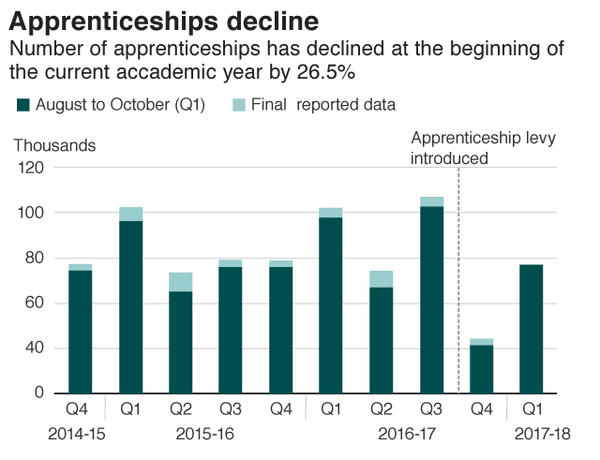“Houston, we have a problem”. Lessons from NASA for engaging employers with the apprenticeship agenda.
“Houston, we have a problem”, those famous words attributed to NASA astronaut John Swigert on the ill-fated Apollo 13 mission back in 1970 could apply equally to the journey of the UK Government’s flagship apprenticeship programme since launch.
Having visited NASA I know that astronauts are trained to deal with operating under some of the most hostile and stressful conditions that can be imagined. Given the huge range of things that can go wrong in space, when faced with a new problem astronauts ask the question ‘is what I am about to do likely to make the situation worse?’
It’s a useful question for the UK Government to consider when assessing what future changes may be required to the apprenticeship programme to deliver its bold ambition for new apprenticeship starts.
Looking specifically at the levy, change is most definitely needed if the Government is going to achieve its mission and bring those apprenticeship numbers home.
Some of the findings and recommendations of the Reform report ‘The Great Training Robbery’ would help to remedy some of the problems, but many of the bigger issues relating to the availability of apprenticeships remain outside of the scope of the report.
The apprenticeship levy was introduced in April 2017 with the ambition to see three million apprenticeships in place by 2020 and to raise £3 billion towards funding it.
Like the Apollo 13 mission it soon started to drift off course leaving the mission very much in the education and skills equivalent of the dark side of the moon.
In general terms it has not been a positive experience for business.

When the first official figures showing apprenticeship starts were released following the introduction of the levy the statistics were dramatic, showing a staggering 61% fall. They have continued to fall since albeit at a less dramatic pace.
At the time a Department for Education spokesperson commented that it had been a period of huge change for employers “but that it is right that employers were taking their time to plan ahead and maximise the opportunities the apprenticeship levy can bring.”
As the old one liner goes, “Denial ain’t just a river in Egypt” so if the UK is to deliver the apprenticeship numbers as set out by the UK Government then radical reform is clearly needed because employers are not engaging in anything like the way originally hoped.

As reported in numerous publications including the Reform report the apprenticeship levy is facing sustained and growing frustration from the commercial sectors often perceiving a well intentioned initiative as poorly executed. Some of the feedback has been brutal.
Chairman of high street shoe repair service Timpson said that “The levy is nothing but a tax” adding “the only way to get money back is a tortuous process of changing your training programme to fit Government guidelines”.
More widely a CIPD survey of more than 1000 employers revealed that 53% would rather see a more generalised training levy than the existing system also noting that just 17% of employers supported the levy in its current form.
The same research has revealed that around 35% of small to medium sized businesses do not intend to use the levy at all writing it off as a tax instead. Even the Chair of the EEF Dame Judith Hackitt, representing the UK’s largest employers organisation has been highly critical of the scheme. Again some of these issues are addressed by the Reform report but wider and perhaps bigger issues remain.
Whilst the current system is clearly not aligned to market forces there is also a wider issue receiving less attention, specifically that to be an apprentice a person needs to have a job.
Employers need assurance and confidence that national economic trends are favourable to prosperity and growth thereby enabling the confidence to support job creation if they are to deliver new apprenticeship opportunities.
Without this, job creation suffers, and current economic uncertainty and anaemic economic growth will be compounding the challenge of meeting the three million apprenticeships target.

Currently it seems increasingly unlikely that the Government can hit its target of three million new apprenticeships by 2020, and in doing so its original mission, something of moonshot, is now looking like it has more in common with Apollo 13 than Apollo 11.
In reforming the system to meet the needs of employers more effectively, policy makers would be wise to take a lesson from the NASA training manual and consider whether if what they are about to do next might in fact make the situation worse.
In doing so, new unintended consequences from well intentioned policies may be avoided and the apprenticeship levy, once reformed, may just yet become the UK Governments own “successful failure”.
Jamie Smith, Executive Chairman, C-Learning Ltd











Responses